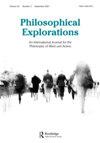Editorial: self-illness ambiguity and narrative identity
IF 1.1
3区 哲学
0 PHILOSOPHY
引用次数: 0
Abstract
Although the concept of self-illness ambiguity is relatively new, the phenomenon is not. It seems likely that people have struggled with the oftentimes ambiguous relation between themselves and their illness ever since the dawn of modern (mental) health care. It is therefore exciting, both from a philosophical as well as clinical point of view, that the concept of self-illness ambiguity is increasingly gaining attention. The history of this concept can be traced back to the late 1980s and early 1990s, when qualitative research started to elucidate how complex the relation between ‘self’ and ‘illness’ is from the perspective of the diagnosed individual (see e.g. Estroff 1989; Estroff et al. 1991). Sociologist David Karp coined the term ‘illness ambiguity’ (e.g. Karp 1992, 1994) to explicate the confusion that often arose when psychiatric patients tried to clarify this relation. Psychiatrist John Sadler, drawing on some of this pioneering qualitative research, offered the first philosophical analysis of this phenomenon and coined the term ‘self-illness ambiguity’ to underscore that both sides of the relation are complex and may as such contribute to the ambiguity of the self-illness relation (Sadler 2003, 2007). Recent years have also witnessed a renewed interest in the ‘self’ in the context of psychiatry, not only because of theoretical considerations (e.g. Tekin 2019), but also because of developing trends in mental health care, such as recovery-oriented care, self-management and person-centered care (e.g. Glas 2019; Slors and Strijbos 2020). This in turn has led to a renewed interest in the phenomenon of self-illness ambiguity (e.g. Dings 2020; Dings and Glas 2020). However, there are still various questions about and domains of self-illness ambiguity that demand further consideration. This special issue seeks to facilitate and focus the debates surrounding these questions and to further philosophical and empirical investigations into key domains of self-illness ambiguity.社论:自我疾病的模糊性与叙事的同一性
虽然自我疾病模糊的概念相对较新,但这种现象并不存在。自从现代(精神)卫生保健出现以来,人们似乎一直在与自己和疾病之间的模糊关系作斗争。因此,无论是从哲学角度还是从临床角度来看,自我疾病的模糊性概念越来越受到关注,这都是令人兴奋的。这一概念的历史可以追溯到20世纪80年代末和90年代初,当时定性研究开始从被诊断个体的角度阐明“自我”和“疾病”之间的关系是多么复杂(见e.g. Estroff 1989;Estroff et al. 1991)。社会学家David Karp创造了“疾病模糊”一词(e.g. Karp 1992,1994)来解释当精神病患者试图澄清这种关系时经常出现的困惑。精神病学家John Sadler借鉴了一些开创性的定性研究,对这一现象进行了第一次哲学分析,并创造了“自我疾病模糊”一词,以强调关系的双方都是复杂的,并且可能因此导致自我疾病关系的模糊(Sadler 2003, 2007)。近年来,人们对精神病学背景下的“自我”重新产生了兴趣,这不仅是因为理论方面的考虑(如Tekin 2019),还因为精神卫生保健的发展趋势,如康复导向护理、自我管理和以人为本的护理(如Glas 2019;Slors and Strijbos 2020)。这反过来又导致了对自我疾病模糊现象的重新关注(例如,丁斯2020;叮当和玻璃,2020)。然而,关于自我疾病模棱两可的领域仍然存在各种问题,需要进一步考虑。本期特刊旨在促进和聚焦围绕这些问题的辩论,并进一步对自我疾病模糊的关键领域进行哲学和实证调查。
本文章由计算机程序翻译,如有差异,请以英文原文为准。
求助全文
约1分钟内获得全文
求助全文

 求助内容:
求助内容: 应助结果提醒方式:
应助结果提醒方式:


